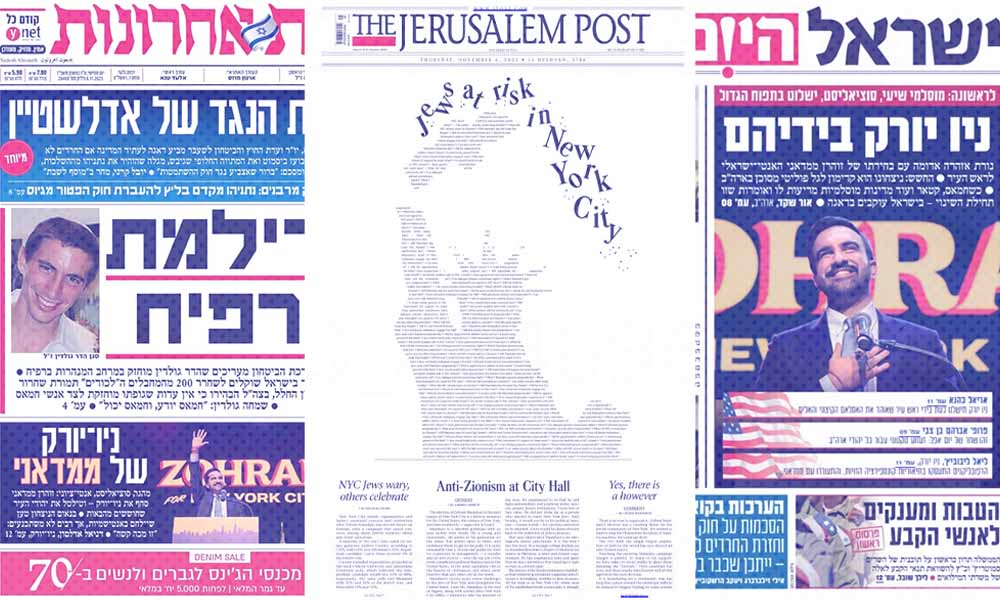“B’Ivrit: A Hebrew Language Media Roundup” is a monthly look at the news through the eyes of Israeli media consumers.
1. Watching Mamdani in Tel Aviv
Last Tuesday was a big night for New York, no doubt about that. It was also an important evening for American politics. But judging by the coverage in the Israeli media, the election of Zohran Mamdani as mayor of New York City is nothing less than an earthquake whose epicenter may have been in City Hall in Manhattan, but whose reverberations shook the Jewish state thousands of miles away.
The interest in New York City’s election in Israel was felt throughout all Israeli news outlets, with endless reports, hours of TV studio discussions and front-page opinion columns. They all carried one message: Oy vey.
“New York fell in their hands,” cried the main headline of Israel Hayom, a right-wing popular daily publication. “Concerns that Mamdani’s victory is only the preview to a dangerous political wave in the US,” the subhead read. And just in case readers didn’t get the not-so-subtle message, the paper offered opinion columns warning that “New York will be ruled by a mayor sympathetic to extreme and violent Islam” and that “it is the dawn of a dark day.”
Yediot Ahronot, Israel’s largest centrist newspaper, ran a photo of Mamdani delivering his victory speech along the entire bottom half of the front page, and while the tone was a tad less alarmist than that of Israel Hayom, the paper warned that “New York Jews are afraid of what’s to come.”
The Jerusalem Post, an English-language daily which is not widely read by Israelis but carries significant influence overseas, chose to go with a graphic cover depicting the Statue of Liberty under the headline: “Jews at risk in New York City.”
In TV and radio studios, interviewers inquired time and again, “How could it be that a third of New York Jews voted for Mamdani?” but only a few actually made an effort to reach out and hear directly from those Jews. Others, mainly Israeli expats living in New York, were frequent guests on the Israeli airwaves last week, one of them even complaining on-air that “there are Muslims praying in the middle of the street,” and noting that many of his friends are purchasing firearms.
Mamadani’s anti-Israeli views should clearly be a source of interest and of concern for Israelis. But based on the coverage by the Israeli press, one could get the impression that the United States is about to launch a war against Israel and that Jewish Americans are hiding in their homes, fearing for their lives.
2. Out of captivity, into the limelight
The release of the remaining 20 living hostages from Hamas captivity last month is still big news in Israel. The press followed every step of the survivors, all men and most of them young, as they were received in Israel, throughout their days recovering in Tel Aviv area hospitals and as they returned to their homes cheered by thousands of friends and neighbors packing the streets.
Now, it is time to hear their stories. The former hostages are a hot commodity for reporters and for bookers on TV shows. The Israeli public is eager to hear about their two-years-long ordeal, their survival and their recovery.
Rom Breslavsky, who was 19 when taken into captivity, described in excruciating detail the torture he underwent by his Islamic Jihad captors. The interview on Channel 13 was hard to watch, but at the same time impossible not to.
Maxim Harkin sat down for an interview with Channel 12’s Uvda, a weekly 60 Minutes-style show, and shared how he hid from Hamas captors the fact that he was a reserve officer in the IDF and how he learned from listening in secret to Israeli radio that his family and hundreds of thousands of Israelis were out in the streets demanding his release. Harkin also spoke of the moment when Itamar Ben-Gvir, Israel’s far-right minister of homeland security, decided to crack down on Hamas prisoners held by Israel. His captors reacted angrily, increasing the torture dosage and at one point writing on Harkin’s back “an eye for an eye” and sending a photo of it to Ben-Gvir.
Alon Ohel, a talented pianist who suffered a severe injury to his eye while in captivity, greeted friends and neighbors upon arriving home from the hospital. All networks carried his speech live. “It’s important to tell you all that I felt your love even in the tunnel 50 meters underground. I felt it every moment,” he said.
Their stories, still being told slowly as more and more former hostages feel strong enough to open up and share their experiences, have a fascinating effect on the Israeli public. For Israelis who had spent two years praying, hoping, protesting and commemorating, these stories provide a moment of closure.
3. Still no press in Gaza
The war may be over, or at least in a state of ceasefire, and for many, life is slowly getting back to normal. All Israeli living hostages and most of the bodies have been returned, many reservists have been released, aid to Gaza is beginning to flow in greater quantities, and efforts to establish the international stabilization force for the region are gaining speed.
One thing hasn’t changed: There is still no free press access to the Gaza Strip.
For the international media, which has sued the Israeli government to allow reporters to enter Gaza, this is a source of ongoing frustration. And while for two years Israel could claim that it is too dangerous to allow outside journalists into a war zone, now this excuse no longer seems valid.
The Israeli press, on the other hand, doesn’t seem to be concerned by the lack of access. The IDF has taken several Israeli reporters on tours of the area still occupied by Israel, but those were limited to interactions with IDF officers and soldiers and did not reach Palestinians on the ground.
Throughout the war, and even before October 7, the Israeli press largely ignored Gaza. Now, the situation on the ground might be changing, but there doesn’t seem to be much interest in telling the other side of the story.
4. MAG goes MIA
For nearly three hours last Monday, Israelis’ attention turned to one place: the dark strip of beach on the Mediterranean coastline north of Tel Aviv, where frantic searches were underway to try and find a missing person. That missing person was Brig. Gen. Yifat Tomer-Yerushalmi, the military advocate general (MAG) who had left a suicide note and whose car was found abandoned nearby.
TV broadcasts went into full emergency mode, reporters descended in droves on the beach and on the MAG’s home, and the entire country followed the unfolding drama. Shortly after 7 p.m., news broke that Tomer-Yerushalmi had been found alive.
To understand the drama, we need to rewind to July 2024. A group of soldiers who served as prison guards at a military detention center known as Sde Teiman, which held suspected Hamas terrorists captured during the Gaza war, were accused of torturing and abusing a Palestinian inmate, allegedly causing him rib fractures, lung puncture and rectal wounds. Right-wing members of the Netanyahu coalition, as well as many of their supporters, were outraged by the arrests of the prison guards and even tried to break into the detention base. The violent protests died down eventually, but the far right kept on claiming that the soldiers had been framed, that there was no place for an investigation against prison guards who, in their description, “roughed up” an alleged Hamas terrorist, and that the military advocate general, who led the investigation, was assisting Israel’s enemies.
Then a tape emerged. A leaked video of the Sde Teiman events found its way to Channel 12 news, Israel’s most watched network, and later to other outlets. It clearly refuted the claims that the soldiers had been framed in some sort of “blood libel,” as some of their defenders had put it.
An investigation was launched to find the source of the leak, and a couple of weeks ago it reached MAG Tomer-Yerushalmi, who eventually admitted that she had leaked the video and later lied about it.
Back to last Monday. As the nation held its breath following the search for her, the temperature in the TV studios heated up. Accusations were hurled at Netanyahu and his far-right partners for driving the top military advocate to take her own life. Some demanded a moment of reckoning from the right-wing media for their baseless allegations against Tomer-Yerushalmi. But once she was found alive, the mood swung immediately. At once, the media went back to hosting columnists and pundits who now accused Tomer-Yerushalmi not only of the Sde Teiman “blood libel,” but of faking her suicide attempt.
The atmosphere became so toxic that Channel 12 had to place body guards to protect its reporter, Guy Peleg, who aired the leaked tape, following threats to his life and protests outside his home.
5. Kazakhstan captures the headlines
Ever since the Sacha Baron Cohen movie Borat came out in 2006, Kazakhstan has been the butt of the joke any time the Central Asian republic is mentioned.
Last week, the joke was on the Israeli press, which fell for a Donald Trump spin.
On Thursday, Trump’s special envoy Steve Witkoff cryptically announced that another country would be joining the Abraham Accords, a set of normalization agreements between Israel and Arab Middle Eastern countries signed during the first Trump administration. The Israeli press immediately burst into breaking news mode, only to discover shortly after that the country joining the Abraham Accords was no other than Kazakhstan.
Not that there’s anything wrong with that. Kazakhstan is a majority-Muslim nation located in a sensitive geographic region, battling counter-influences from Iran, Russia and China. The only problem is that Kazakhstan already has full diplomatic relations with Israel—since 1992. The two countries have a robust military and commercial relationship and senior officials from both sides have made visits to each other’s countries.
On Thursday evening, hours after Witkoff’s teaser, President Trump announced the deal on Truth Social, and later repeated it in front of the cameras during an Oval Office meeting with the president of Kazakhstan, Kassym-Jomart Tokayev, and four other Central Asian nations.
The Israeli press bought into the American spin, reporting extensively about the “expansion” of the Abraham Accords. The next day, many outlets felt a need to explain how a framework that was set out to normalize relations between Israel and its Arab neighbors is now a catch-all phrase for any Muslim-majority country that wants to declare its sympathy to Israel, regardless of existing diplomatic relations.
The Trump administration made a branding move, effectively changing the definition of the Abraham Accords in order to demonstrate progress in broadening the circle of countries favorably relating to Israel. The press in Israel worked overtime to explain exactly how this works, and what it means to normalize relations with a nation that already has perfectly normal relations with Israel.


